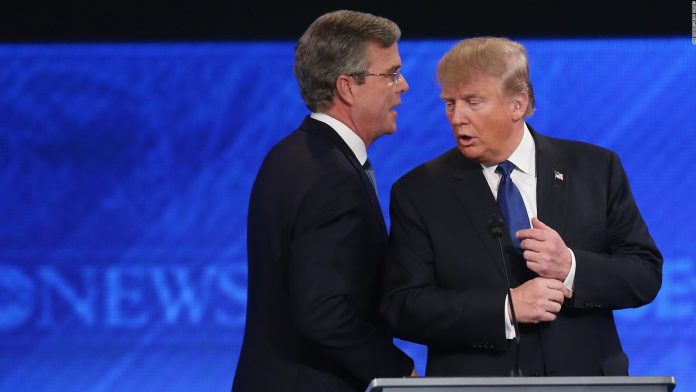
One of the defining Donald Trump mantras during the Republican presidential primary session was that Jeb Bush was a “low-energy” candidate – and that’s not the worst thing he said about him. He also called the former Florida governor “an embarrassment to his family,” as well as “a stiff” and termed Bush’s support for the Common Core State Standards as “pathetic.”
The last insult makes it worth noting that the president-elect has selected a very close Bush ally to be his education secretary. Betsy DeVos donated to Bush’s unsuccessful presidential campaign and sat on the board of Bush’s Foundation for Excellence in Education. The two share an education reform policy that supports the transfer of public dollars to privately run schools, such as for-profit charter schools and voucher programs that use taxpayer funds to pay for private schools. They say are providing parents with choice; critics say they are destroying the public education system.
Bush called DeVos an “extraordinary choice” after Trump nominated her late last year, and Barbara Bush, Jeb’s mother, just endorsed the Michigan billionaire in an op-ed published the Portland Press Herald, noting that she has worked with DeVos over a period of years:
“I am enthusiastically endorsing Betsy DeVos to be our next secretary of education. Mrs. DeVos has a real compassion for children and a proven record of championing reforms to improve literacy and learning in our nation. I am confident that she will provide the leadership we sorely need to raise the bar on education in America and provide better opportunities for our most vulnerable students.”
Given that DeVos’s education philosophy is right in line with Bush’s, and Trump liked what she had to see when he was picking someone to run the Education Department, her confirmation means that Jeb Bush’s longtime education agenda will strongly inform education policy over the next four (possibly more) years. Furthermore, other Bush allies are reportedly in the mix to be DeVos deputies, including Hanna Skander, New Mexico’s public education secretary who is one of the “Chiefs for Change” that are part of Bush’s foundation.
Bush lost the race to be the Republican presidential nominee, but if DeVos is confirmed, he’s a bigger winner in education policy.
Bush as much as anyone led the corporate school reform movement – treating public schools as if they were for-profit businesses – turning Florida into a testing ground when he became governor of the state in 1999. He created a “Florida Formula” of schools reforms that became a model for other states, including state “report cards” that assign letter grades to schools based largely on test scores and widespread school choice right after he became governor of Florida in 1999.
DeVos has nothing but praise for what Bush and other Florida officials have done. In a 2015 interview with Philanthropy Roundtable, she said in part:
Through its tax-credit scholarship program, Florida has enjoyed the nation’s longest period of widespread educational choice, and through the expansion of the program, it has an ever-growing number of students – currently over 50,000 – attending the school of their family’s choice.
Bush was a strong supporter of the Common Core State Standards. Trump repeatedly trashed the initiative, saying he would eliminate it. (That would actually require action by state officials.)
DeVos says she is not a supporter of the Core, but she is perceived as supporting them, in part because of her strong connection to Bush, and she didn’t speak out against them when Bush was strongly supporting its adoption by states and implementation.
Bush doesn’t refer to public schools as public schools. Instead, he says the United States has “over 13,000 government-run monopolies run by unions.” It is worth pointing out that DeVos’s husband, Richard DeVos, with whom she has worked on school reform gave a speech on Dec. 3, 2002, at the conservative Heritage Foundation laying out a national strategy to expand school vouchers and school choice by rewarding and punishing legislators who went along – or didn’t. During the speech, he advised that supporters call public schools “government schools,” as a pejorative, and urged that they “be cautious about talking too much about these activities” so as not to call attention and garner opposition.
Featured Image: Twitter
(c) 2017, The Washington Post

